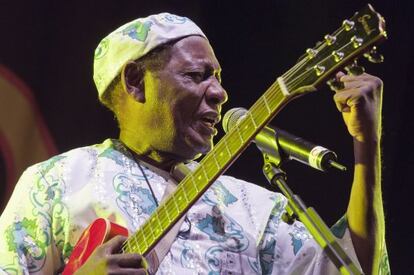Womad celebrates its 21st edition by fighting cuts with counterculture
Ebo Taylor and Lenacay close 2012 edition of Extremadura world music festival

After midnight on Saturday, the singer from Lenacy - a spinoff of the Barcelona band Ojos de Brujo - made a request to the crowd. Backed by a rumba beat, he said that despite the current orgy of cutbacks and deficit terrorism, we should all fight to stop them from stamping out alternative culture. It was then that everything at Womad Cáceres took on a new meaning. They may have cut the budget for this year's edition of the world music festival by 37 percent (on top of a 16-percent slash in 2011), but they haven't curbed its appetite for questioning the dominant cultural discourse.
Earlier, many had found it difficult to recognize the spirit of Ojos de Brujo in this hybrid band, which fuses flamenco with rumba and elements of rap and electronica. But when the band brought its performance to a close with a carefree hymn to Barcelona's Las Ramblas, it was at one with the masses in the Cáceres night - a heterodox mix, all brought together by the call of Peter Gabriel's international Womad brand, which is now celebrating its 30th anniversary.
Given the fact that many of its musicians come from countries where the economic crisis isn't exactly recent news, the festival programmers managed to overcome the public cuts with dignity (the event is financed by the city council, the Cáceres provincial and Extremadura regional governments, and the Caja de Extremadura savings bank). They countered the tide of neoliberal pragmatism with headliners such as the Ghanaian Ebo Taylor. While not a big name, he is still a legend of Highlife - a musical style born in western Africa in the 1920s, and that was bestowed with its most revolutionary meaning in the 1960s and 1970s, in the wake of the ephemeral if joyous moment when countries across the continent achieved independence.
Ebo Taylor could be seen as the contrast to Fela Kuti, the father of Afrobeat
Taylor, 76, could be considered as the luminous and spiritual contrast to Nigeria's Fela Kuti, the rebellious father of the Afrobeat revolution with whom he studied music in London. Fronting his eight-piece band, Afrobeat Academy, made up of musicians from the United States, Europe and Ghana, Taylor combined his old hits, such as the delightfully arabesque funk of Love and Death, with tracks from his new album, Appia Kwa Bridge. He owes his comeback to the London label Strut Records, which, after issuing his works as a producer, guitarist and arranger in the 1970s and 1980s, brought him back out of retirement to record and tour.
Also playing to the 20,000-strong crowd packing Cáceres' main square was Deolinda, an update of the great melancholic fado tradition, whose fans, many of whom had come from neighboring Portugal, mobbed the dressing rooms.
But the surprises of the festival, which this year celebrated its 21st edition, were on the Plaza de San Jorge stage, which hosted Aziza Brahim, a Sahrawi desert princess; and Brassroots, a collective of brass musicians adapting everything from dark dubstep anthems to Luther Vandross hits. What might sound like a vulgar appeal to collective pop memory on paper is, in practice, a no-nonsense party driven by a trombonist with a gift for showmanship.
The moment after the final performance, when the loudspeakers of a nearby nightclub started pumping out the usual mix of Spanish pop and cheesy dance music, served as a reminder of the obvious: the best way of stopping them from stamping out alternative culture is to stubbornly go on cultivating it.
Tu suscripción se está usando en otro dispositivo
¿Quieres añadir otro usuario a tu suscripción?
Si continúas leyendo en este dispositivo, no se podrá leer en el otro.
FlechaTu suscripción se está usando en otro dispositivo y solo puedes acceder a EL PAÍS desde un dispositivo a la vez.
Si quieres compartir tu cuenta, cambia tu suscripción a la modalidad Premium, así podrás añadir otro usuario. Cada uno accederá con su propia cuenta de email, lo que os permitirá personalizar vuestra experiencia en EL PAÍS.
¿Tienes una suscripción de empresa? Accede aquí para contratar más cuentas.
En el caso de no saber quién está usando tu cuenta, te recomendamos cambiar tu contraseña aquí.
Si decides continuar compartiendo tu cuenta, este mensaje se mostrará en tu dispositivo y en el de la otra persona que está usando tu cuenta de forma indefinida, afectando a tu experiencia de lectura. Puedes consultar aquí los términos y condiciones de la suscripción digital.









































